January
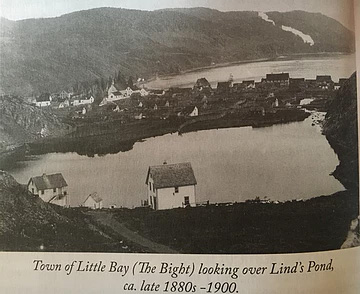 The year 1886 opened bleak as the fisheries were increasingly dismal and the mining operations had now been slowed for months. In a letter to the editor of the Twillingate Sun that January was written “We have just entered upon another New Year, and what has it brought us more than years that are passed? To the poor it has brought poverty, hunger and cold. [. . .] We can see men and women (walking skeletons, for nothing better we can call them) wending their way to the Magistrates, begging relief to keep themselves and their families from actual starvation. They say they don’t want pauper relief; we want employment and are able and willing to work for our bread, but his worship informs them that he can do nothing at present for able bodied poor” (Twillingate Sun, January 23, 1886). Yet even during these times money was sent to even poorer regions and Mr. James White of Little Bay donated to the Labrador Relief Fund (Twillingate Sun, January 9, 1886).
The year 1886 opened bleak as the fisheries were increasingly dismal and the mining operations had now been slowed for months. In a letter to the editor of the Twillingate Sun that January was written “We have just entered upon another New Year, and what has it brought us more than years that are passed? To the poor it has brought poverty, hunger and cold. [. . .] We can see men and women (walking skeletons, for nothing better we can call them) wending their way to the Magistrates, begging relief to keep themselves and their families from actual starvation. They say they don’t want pauper relief; we want employment and are able and willing to work for our bread, but his worship informs them that he can do nothing at present for able bodied poor” (Twillingate Sun, January 23, 1886). Yet even during these times money was sent to even poorer regions and Mr. James White of Little Bay donated to the Labrador Relief Fund (Twillingate Sun, January 9, 1886).
Luckily things would improve this year and that same month the Little Bay mine was said to be “looking healthy [and] eight hundred feet deep, with no decrease of ore. [. . .] A barque [was] loading at the wharf. The reports from the copper markets [were] cheering” (Evening Telegram, January 20, 1886). Four crew of “the Barque, Arina, from England which lay at the Loading Wharf” were arrested for disobeying their captain’s orders. They were sentenced to hard labour and fines (Wells, 103-104).
On January 11th, Patrick Mahoney “forced his way into the house of Mr. Alfred Dean. [He] was secured by [the police]. [He] had a small hatchet with him at the time of his arrest. He appeared to be quite insane” (Wells, 103). Patrick Mahoney was brought to St. John’s “from Little Bay Mines [. . .] by the Hercules, and consigned to the Insane Asylum” (Evening Telegram, January 27, 1886). On January 18th, Thomas Bouzane and two other men were arrested for “loitering in and about the streets at lamb’s corner” (Wells, 104). They were fined “with a caution that if they were brought before [the magistrate] on a similar charge he would visit them $4.00 instead of one” (Twillingate Sun, March 6, 1886).
February
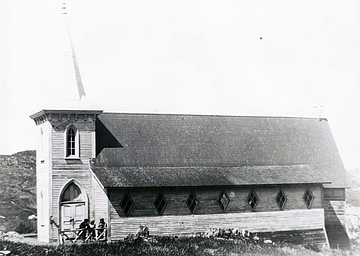 On February 11th a raffle was held “in The Bight at Mrs. Dunphy’s [where] about 30 or 40 men [were] preparing to fight [with] others trying to keep the peace. [The police] succeeded in clearing the house after which some of them became disorderly on the street” (Wells, 105). “James Coady was brought up before his worship charged [along with other men] for being drunk and disorderly. [. . . ] They paid their fines and looked as pleasant as birds. [. . .] Anthony Mansfield, having been brought up under a summons on the Complaint of William Bonar, for an assault and battery committed on him on the night of the 10th. The complainant wore a pair of black eyes, said to have been caused by the Defendant with a bottle, [. . .] it was a disgrace to civilization and the 19th Century” (Twillingate Sun, February 11, 1886). On February 15th another man was arrested for assault (Wells, 105).
On February 11th a raffle was held “in The Bight at Mrs. Dunphy’s [where] about 30 or 40 men [were] preparing to fight [with] others trying to keep the peace. [The police] succeeded in clearing the house after which some of them became disorderly on the street” (Wells, 105). “James Coady was brought up before his worship charged [along with other men] for being drunk and disorderly. [. . . ] They paid their fines and looked as pleasant as birds. [. . .] Anthony Mansfield, having been brought up under a summons on the Complaint of William Bonar, for an assault and battery committed on him on the night of the 10th. The complainant wore a pair of black eyes, said to have been caused by the Defendant with a bottle, [. . .] it was a disgrace to civilization and the 19th Century” (Twillingate Sun, February 11, 1886). On February 15th another man was arrested for assault (Wells, 105).
The mine was reported as working and productive (Twillingate Sun, Feb 13, 1886). The mine, however, was never short on tragedy. On February 18th Joseph Goudie suffered as “a large mass of burning ore foundered from the pile [and] caught the unfortunate man by the legs [burning off] his left foot.” The doctor amputated the leg, an “operation lasting nearly four hours during which time the patient was under chloroform. [However, his] bowels were even burnt through in one place. In short, he was all burnt to tinder from the hips down.” Nothing more could be done so he was kept comfortable with morphine until he died that evening (Wells, 106). The funeral took place on the 21st at St. Andrew’s Church. “In the absence of the Reverend Mr. Clift, the Lay reader, Mr. Lind, officiated” (Wells, 107).
March
Religious tensions were increasing and on March 4th a $10.00 reward was offered for information leading to the arrest of those responsible for posting notices at the Loading Wharf which read “No Papists need apply as only genuine Protestants are required in this job” (Wells, 108).
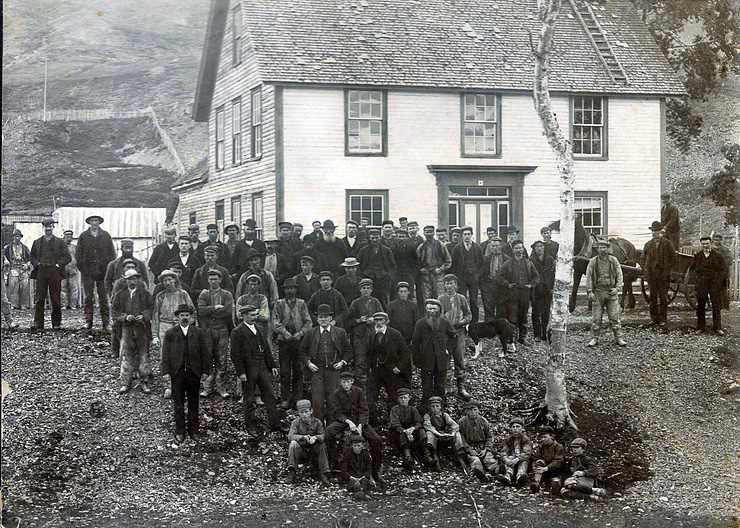 The following “wages were fairly typical of most Notre Damn copper mines of this period” (Martin).
The following “wages were fairly typical of most Notre Damn copper mines of this period” (Martin).
Engineers – 6 to 8 shillings daily
Miners – 6 shillings and 6 pence
Strikers – 5 shillings and 6 pence
Men and Boys on copper floor – 5 shillings and 6 pence
Men in jigging mill and smelters – 4 shillings and 6 pence
Boys employed about the mine works – 2 shillings
It was written that the Little Bay mining operations “resumed on an extended scale. It is reported that 200 men are at work, and that when spring opens there is prospect of a much larger force being employed. The prospects of the mine are said to be excellent” (Engineering and Mining Journal, 1886). In a letter to the editor of the Twillingate Sun on March 4th was reported that “business is improving in the mining region. [. . .] The mining business of Little Bay has been in a very depressed state [but] it is expected [to] improve, as it is said that a considerable number of men will be employed the coming summer. [. . .] There are at present between two hundred and fifty and three hundred men employed on the whole works, and about one hundred and twenty men who are employed on the copper floor, jigging mill, and smelting works. [Ore is] hoisted to the surface and then transported by means of a tram road to the copper floor, where there are about forty men and boys employed in sorting the different qualities of copper. It is then taken by tram to the jigging mills, when it is ground and lifted for the smelting works, where, under the charge of the Superintendent, it is got ready for the home markets. [. . .] The winter so far has been very favourable to the working of the mine the weather being very mild and pleasant. [. . .] Other business is not so brisk as might be expected, owing to the great depression of trade for the last twelve months. [. . .] The want of a good system of mail [. . .] has been long felt in this locality. It is nothing unusual for the mail to be closed for hours before the mail leaves for the South ; nor can any postage stamps be procured for four hours before it departs. Another feature in our postmaster’s character, is that he is not very courteous. [He] would not be allowed to hold office in any other of the British possessions. [. . .] Our places of amusement are limited to one at present, a billiard room and skittle alley, which on account of the scarcity of script receives but very little custom” (Twillingate Sun, March 20, 1886).
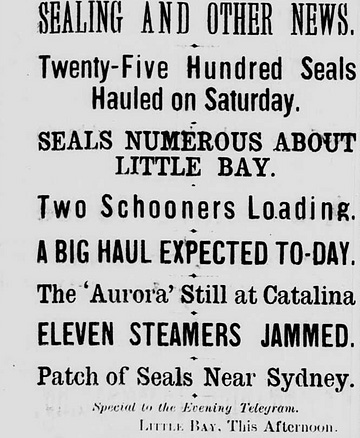 The Evening Telegram reported on good sealing at Little Bay on March 22nd and again on March 27th. Wells writes of the seals spotted off Little Bay Islands on March 20th and reports on the 22nd of “great excitement in the village today. All hands off to the Isles” (Wells, 109). The seal hunt was all the talk and continued through to the end of March. In other hunting news, a letter to the editor on March 20th contained a complaint about the fact that local fishermen were starving while game hunters killed caribou by the dozens. He writes “what do we see on the hunting ground after the sweets from these three Bush Ranger’s Cariboo’s clean away? Why. Mr. Editor, no less than four hundred of choice caribou, slaughtered in true American fashion, and there (on the slaughter field) to remain and rot.” He asks “Where was Capt. Kennedy in H.M.S. Druid at this time ; for aught I know he may have been lying quietly at Bermuda” (Twillingate Sun, March 20, 1886).
The Evening Telegram reported on good sealing at Little Bay on March 22nd and again on March 27th. Wells writes of the seals spotted off Little Bay Islands on March 20th and reports on the 22nd of “great excitement in the village today. All hands off to the Isles” (Wells, 109). The seal hunt was all the talk and continued through to the end of March. In other hunting news, a letter to the editor on March 20th contained a complaint about the fact that local fishermen were starving while game hunters killed caribou by the dozens. He writes “what do we see on the hunting ground after the sweets from these three Bush Ranger’s Cariboo’s clean away? Why. Mr. Editor, no less than four hundred of choice caribou, slaughtered in true American fashion, and there (on the slaughter field) to remain and rot.” He asks “Where was Capt. Kennedy in H.M.S. Druid at this time ; for aught I know he may have been lying quietly at Bermuda” (Twillingate Sun, March 20, 1886).
The war against alcohol was getting increasingly intense as was the tension between Sergeant Wells and Constable Meaney. On March 31st Wells’ wrote “On visiting the billiard room [. . .] I found Constable Meaney and four other persons playing cards (as I afterward discovered) for beer” (Wells, 111).
April
While the mine was recovering the fisheries were not. Here starts to be much talk of developing agriculture as a third option. A letter to the editor read, “For the past twenty years the Fisheries have been failing. [. . .] The state of the country has arrived at a great crisis and the only means of bringing about a better state of things is by the more general extension of Agriculture. [. . .] Seeing what splendid land and forest timber we have around Hall’s Bay and other parts, I am at a loss to understand why so many of the hardy fishermen [. . .] persist in living there as they do, with barely sufficient to exist upon. If farms be established, the produce of which would find a good sale at Little Bay. [We must] do that which will bring about an extension of Road Service, which will lead to the extension of agriculture” (Twillingate Sun, April 3, 1886).
Many persons were arrested for drinking throughout the month of April (Wells, 111-112). On April 14th John Mansfield was “summoned for 5 1/2 month care and attendance on his illegitimate child.” Dr. Joseph was summoned as a witness for the defendant. Mr. Mansfield was ordered to pay $6.00 monthly for the child (Wells, 113). Later that month the police “found Mary Squires (a prostitute) lying in a punt on the beach. With the assistance of a civilian” she was taken to the jail (Wells, 114).
May
The town was seeking the construction of a new road. In a letter to the editor was written “This road will not only be the means of connecting valuable mining properties, but it will also traverse a valuable tract of land which, if once made available [. . .] would attract many settlers, who [will] find agriculture to be a profitable industry. [. . .] A very great injustice has been done the important settlement of Little Bay. Little or no money has ever been expended there in the construction of roads. There are a very large number of people residing there, and from its importance there ought to be good roads. [. . .] A quantity of Government seed potatoes was received [. . .] for distribution among the poor people who are short of seed. We understand that they are on account of the road grant, and that able bodied persons receiving them will be expected to give an equivalent in labor on the roads next fall” (Twillingate Sun, May 29, 1886).
The number of dogs in the community was staggering as everyone required them for dogsleds and there was no means of getting them fixed. The police duty of “dog shooting” was underway with seven animals destroyed this month. On May 10th John Bouzane and John Cushan were arrested for being drunk (Wells, 115). From May 23rd through the rest of the month the police sought a man named David Drover who was “believed [to be] deranged” (Wells, 117). Sergeant Wells continued to make snarky remarks in his journals as to the behaviour of Constable Meaney who drank, gambled, and stayed out too late. On May 31st Sergeant Meaney took a trip to Harbour Round (Wells, 118).
June
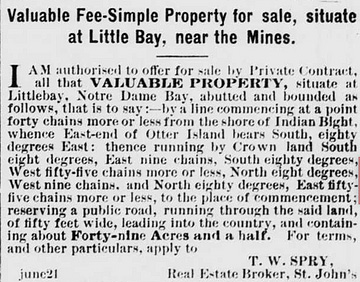 The missing man, David Drover, had walked “to Brent’s Cove and was four days and nights walking in the country [. . .]. When he was found he was much exhausted, his legs and feet were torn and swollen and his mind was unsettled. Four men [were] guarding him at Round Harbour. The steamer Hiram Perry went there [. . .] to take him to Little Bay” (Evening Telegram, June 8, 1886). Constable Meaney returned with David Drover on June 1st. Wells wrote “The prisoner appears to be quiet sane, and has acted very quiet and orderly, in fact. He has conducted himself as well as any sane man.” He was attended to by Dr. Joseph. On June 2nd the police searched for another missing man who had deserted ship the previous evening. The man was located on June 4th (Wells, 119).
The missing man, David Drover, had walked “to Brent’s Cove and was four days and nights walking in the country [. . .]. When he was found he was much exhausted, his legs and feet were torn and swollen and his mind was unsettled. Four men [were] guarding him at Round Harbour. The steamer Hiram Perry went there [. . .] to take him to Little Bay” (Evening Telegram, June 8, 1886). Constable Meaney returned with David Drover on June 1st. Wells wrote “The prisoner appears to be quiet sane, and has acted very quiet and orderly, in fact. He has conducted himself as well as any sane man.” He was attended to by Dr. Joseph. On June 2nd the police searched for another missing man who had deserted ship the previous evening. The man was located on June 4th (Wells, 119).
The case of Little Bay’s potential as an agriculture region is continued in letters to the editor in St. John’s. The writer says “I guarantee some important claims from the fertile lands of Little Bay. [. . .] It is more apt to prove a success than other parts of the island, on account of its affording a good cash market. [. . .] Miners are calculated to make the best settlers, as their occupation is not so desultory as the fisherman’s. I trust the new act renders it more easy to obtain agriculture grants in mining localities, if not the Government must buy out the properties” (Evening Telegram, June 2, 1886). To this day the sale of land in Little Bay is hindered by the ownership of long-deceased mine management – a lasting legacy of the early conspiracies.
The summer months were dangerous. It was said that “Forest fires [were] usual at this season of the year” (Harbour Grace Standard, June 6, 1886). On June 7th a “Forest fire on the north side of Indian Bight, [was] caused by Mrs. Snow burning ground” (Wells, 120). On June 10th “Forest fires broke out in three different places at Little Bay [and] four houses were destroyed” (Evening Telegram, June 10, 1886). A fire destroyed the home of Joseph McKinnon on the 19th (Wells, 121).
On June 12th a prisoner named Arthur Morrison escaped from the jail and had to be re-arrested. He’d been charged by his wife but as she didn’t appear against him in court on the 14th all charges were dropped (Wells, 120). Constable Meaney shot and killed six dogs on June 16th (Wells, 121). On June 25th, the police sought more firepower for the ongoing duty of dog shooting. Wells wrote to Inspector Fawcett that they had “two rifles with side arms but no ammunition” (Wells, 122).
July
On July 3rd Sergeant Wells and Magistrate Blandford left to catch some arsonists. They returned with the prisoners on the 4th (Wells, 125). The police went on the hunt for Shebeen Houses on the 12th and made several arrests for drinking (Wells, 127). Late at night “Sergeant Wells and Constable Meaney (‘the ever victorious army’) set out on their mission [. . .] to conquer the enemy of our people, both were dressed in civilians clothes. The Sergeant had all his whiskers shaved off and a patch of sticking plaster on his nose, his eyebrows and mouth stach blacked with ‘Ayer’s Hair Vigor’ [and claimed to be] travellers from Roberts Arm [looking] for a drop of stuff” and caught several sellers of liquors by surprise (Twillingate Sun, March 11, 1887). The harassment of the few licensed publicans continued when Constable Meaney charged the innkeeper, Daniel Courtney, with failing to have correct signage (Wells, 127). On July 24th, John Martin was arrested for acting “very violent towards the other labourers. [He was] suffering from Delirium Tremens” (Wells, 135).
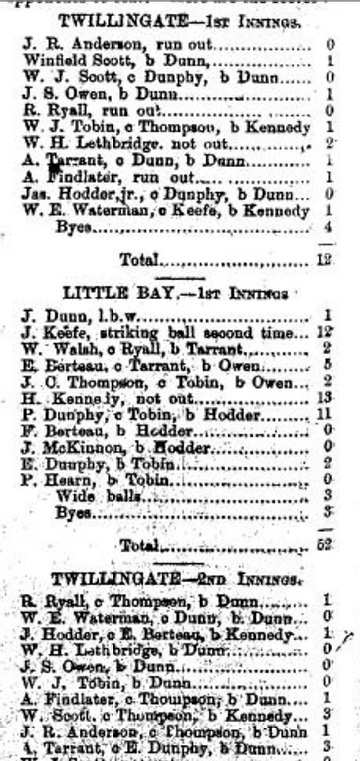 On July 17th, an “accident occurred in the pond in front of the Court House [. . .] which resulted in the drowning of two boys, named Small and Quigley. [. . .] Quigley, not being able to swim, had got too far into deep water. So Small, who was the good swimmer, went to his rescue, but Quigley seized hold of Small [and] in the struggle, they both sank to rise no more” (Wells, 134). The “two boys [. . .] whilst bathing in the small lake behind the cottages in the Bight, got into deep water. One only could swim. [He] tried to help the other, and unfortunately, within call, within sight of houses, both were drowned. The eldest was 13 years of age, the other a little less. The doctor and many helpers did their utmost for a long time, but they had been too long in the water” (Twillingate Sun, July 24, 1886). It was reported on July 31st that “Martin Andrews, while on his way to Little Bay [. . .] lost his boat. [It] sank almost immediately. He just had time to jump in his small boat and save himself. Andrews had on board nearly all his household effects, so that the loss sustained must have been a severe one to him” (Evening Telegram, July 31, 1886).
On July 17th, an “accident occurred in the pond in front of the Court House [. . .] which resulted in the drowning of two boys, named Small and Quigley. [. . .] Quigley, not being able to swim, had got too far into deep water. So Small, who was the good swimmer, went to his rescue, but Quigley seized hold of Small [and] in the struggle, they both sank to rise no more” (Wells, 134). The “two boys [. . .] whilst bathing in the small lake behind the cottages in the Bight, got into deep water. One only could swim. [He] tried to help the other, and unfortunately, within call, within sight of houses, both were drowned. The eldest was 13 years of age, the other a little less. The doctor and many helpers did their utmost for a long time, but they had been too long in the water” (Twillingate Sun, July 24, 1886). It was reported on July 31st that “Martin Andrews, while on his way to Little Bay [. . .] lost his boat. [It] sank almost immediately. He just had time to jump in his small boat and save himself. Andrews had on board nearly all his household effects, so that the loss sustained must have been a severe one to him” (Evening Telegram, July 31, 1886).
Fishing prospects were still awful and it was written that it had “never been so bad in the bay ; but [. . .] a few squids [had] appeared and some [had] done fairly well with them. [. . .] The gardens [were] doing very well ; some potatoes however [were] injured by frost. Little Bay [was] in a healthy state. A steamer from England arrived [. . .] with coke and general provisions. Pilley’s Island has been the resort of men from all parts of the bay seeking for work. They seem to have the required number for present purposes so, many have been refused employment. Those who are engaged there at work have very hard times of it” (Twillingate Sun, July 24, 1886).
Cricket was still all the rage and “a challenge was accepted from the Pioneer Cricket Club of Little Bay, by the Nil Desperandum Club of Twillingate and the match was played [in Twillingate with] the weather being all that could be desired. [. . .] The Little Bay cricketers showed themselves to be experts at the game [and won] a great victory” (Twillingate Sun, July 24, 1886).
August
Little Bay’s continued mining operations were in contrast to the Island’s “mining industries [which were] at a standstill, with the exception of Little Bay, where active operations [were] carried on under the able management of Mr. White” (Evening Telegram, August 11, 1886).
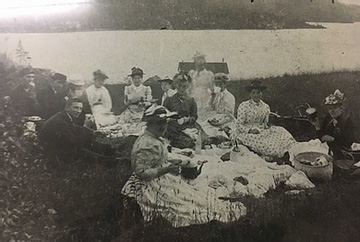 August 7th saw the police execute four more dogs. That night, Wells’ wrote that it was “all quiet on the street except for Ellen Cooney who had been all night crying around the streets because her son, Ned, [had] gone away [to] New York” (Wells, 135). On August 10th William Ditton and Mary Corbin were arrested for “feloniously and maliciously [putting in Peter Manley’s] stove pipe a certain quantity of mining powder” (Wells, 136). On August 30th, James Kennedy was arrested “on the complaint of James Quirk for threatening language” (Wells, 137). On August 22nd a fire “threatened to sweep through the whole village but, fortunately, the wind veered [. . .] Four tilts were destroyed but, the unfortunate inmates being so poor, very little was lost” (Wells, 136). On August 26th the boat races were held and “The Church of England Sunday School picnic left [. . .] in the SS Hiram Perry for Wild Bight. Constable Meaney and His Worship accompanied” (Wells, 137).
August 7th saw the police execute four more dogs. That night, Wells’ wrote that it was “all quiet on the street except for Ellen Cooney who had been all night crying around the streets because her son, Ned, [had] gone away [to] New York” (Wells, 135). On August 10th William Ditton and Mary Corbin were arrested for “feloniously and maliciously [putting in Peter Manley’s] stove pipe a certain quantity of mining powder” (Wells, 136). On August 30th, James Kennedy was arrested “on the complaint of James Quirk for threatening language” (Wells, 137). On August 22nd a fire “threatened to sweep through the whole village but, fortunately, the wind veered [. . .] Four tilts were destroyed but, the unfortunate inmates being so poor, very little was lost” (Wells, 136). On August 26th the boat races were held and “The Church of England Sunday School picnic left [. . .] in the SS Hiram Perry for Wild Bight. Constable Meaney and His Worship accompanied” (Wells, 137).
September
September 7th found “two dead dogs (which had been shot by the police) now lying in the point at the Loading Wharf. [Wells] employed a man [. . .] to take the dogs out of the water and dig holes and bury them” (Wells, 138). On September 9th, Mark Snow was in lockup on charges of bastardy (Wells, 139). On September 11th, John Maddock was arrested “for forcibly breaking and entering.” Two more dogs were killed this day, another six on the 13th, and two more on the 14th (Wells, 139-140). On September 13th “Mrs. Manney brought a goat to the pound [. . .] which was afterwards found to belong to a Mrs. Fahey. She was fined [. . .] for having her goat at large without a yoke” (Wells, 140).
On September 15th the Supreme Court opened with cases heard for the next five days (Wells, 140-141). Supreme Court ran until September 19th. “Court was held and all necessary business transacted. The Court is efficiency presided over this term by Mr. Justice Little. [. . .] He offered sentiments of encouragement and hoped that some effort would be made to relieve the cases of destination that [were] likely to arise in various directions. In concluding, the Judge again congratulated them on the immunity of crimes in the community. [Roads and] other matters of importance such as the erection of a public wharf and the establishment of a Savings’ bank, [were] also mentioned [as the] Public Wharf [was] a much felt want” (Twillingate Sun, September 25, 1886).
The ship Victor belonging to Mr. Benson of Little Bay and mastered by Mr. Bazan was lost in Labrador along with three other vessels. The ship’s crews managed to escape but a large load of much needed fish was lost with the ships (Twillingate Sun, September 18, 1886). On September 19th “William Garman, died at the mines, from the effects of a blow on the head” (Wells, 141). He “was fatally injured [. . .] by a hammer falling from the hoisting tub, a distance of one hundred feet. His skull was fractured and he was insensible for seventy-two hours. Death took place [in the] morning” (Evening Telegram, September 20, 1886). By September 23rd Willy Lind “was working in the company store at Little Bay” with his father (Taylor, 116).
October
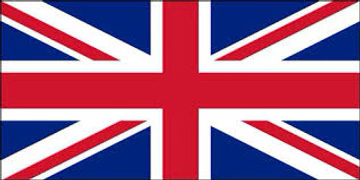 On October 2nd was reported that Little Bay had a heroine. Her story follows: “Elizabeth Pilgrim, who lately performed an achievement that takes no mean rank, as evidencing the possession of calm courage in the face of danger – possibly of death. She was employed as stewardess on board Benson’s craft, the Sarah Jane, which was anchored in Fish Cove, Labrador, and, at the time, was alone in the vessel [when] suddenly a gale sprang up [. . .] the waves rose high and broke over the deck [but] she was nothing daunted. [. . .] she seemed destined to be dashed upon the rocks, against which the sea broke in mountainous waves. Then the girl’s qualities came out in their true colors. She ran to the windlass [. . .] to pay out chain, but still the craft kept drifting to destruction, while the roar of wind and sea rang [with] fierce waves breaking over the bow [. . .], but she kept on at her work till she had [enough] cable paid out. [. . .] the craft bore the strain and afterwards rode out the storm. [The crew] expected to find the shore strewn with the wreckage [. . .] but to their amazement she rode there intact, peacefully at anchor, while the girl attached the Union Jack to the halyards and ran it up to the masthead as a signal of her safety” (Evening Telegram, Oct 2, 1886).
On October 2nd was reported that Little Bay had a heroine. Her story follows: “Elizabeth Pilgrim, who lately performed an achievement that takes no mean rank, as evidencing the possession of calm courage in the face of danger – possibly of death. She was employed as stewardess on board Benson’s craft, the Sarah Jane, which was anchored in Fish Cove, Labrador, and, at the time, was alone in the vessel [when] suddenly a gale sprang up [. . .] the waves rose high and broke over the deck [but] she was nothing daunted. [. . .] she seemed destined to be dashed upon the rocks, against which the sea broke in mountainous waves. Then the girl’s qualities came out in their true colors. She ran to the windlass [. . .] to pay out chain, but still the craft kept drifting to destruction, while the roar of wind and sea rang [with] fierce waves breaking over the bow [. . .], but she kept on at her work till she had [enough] cable paid out. [. . .] the craft bore the strain and afterwards rode out the storm. [The crew] expected to find the shore strewn with the wreckage [. . .] but to their amazement she rode there intact, peacefully at anchor, while the girl attached the Union Jack to the halyards and ran it up to the masthead as a signal of her safety” (Evening Telegram, Oct 2, 1886).
October 3rd, two young boys were arrested for stealing from the Reddin Brothers shop in The Bight but were released due to their young age (Wells, 141). October 20th saw a court case with much public interest “in the matter of the Petition of Joseph Huestis, of Little Bay, Lumberer, praying that he be declared Insolvent” (Evening Telegram, October 20, 1886). On October 26th Colonel Fawcett visited and was paraded “in full dress with side arms” during his inspection (Wells, 143).
October 27th saw two fires which “owing to a strong southwest breeze [at] one time, threatened to sweep everything before it; but, fortunately, towards evening the wind decreased and, with the efforts of the miners, the buildings in and around the mines were saved. Notwithstanding that, the fire burnt all around the magazine, or powder house” (Wells, 144). On this month the government “granted a liberal appropriation for the construction of a road from Little Bay to Hall’s Bay” (Twillingate Sun, October 16, 1886).
November
On November 6th, “Thomas Guy was arrested by the Magistrate [as he] had gone to the Magistrate’s residence and began to swear and act in a very disorderly manner” (Wells, 145). On November 16th, the police arrested “Richard Cahail for the larceny of a pair of shoes” (Wells, 147).
On November 20th the mine was given a favourable report which said “About 600 men are now at work. The output of ore is very satisfactory, and under the new management, the developments of the mine are of the most encouraging description. The price of copper ore has also advanced, so that the prospects are brightening. This is a very important matter for the people” (Harbour Grace Standard, November 20, 1886). On November 30th “a vessel, named the Nushka [. . .] from Port Cabella, S.A., with a cargo of copper ore, [was] bound for Little Bay. There her ore [would] be either crushed or smelted as may seem best, and be forwarded by steamer to Swansea” (Evening Telegram, November 30, 1886).
December
Farmers in Trinity Bay had “kill large numbers of cattle and ship them per Plover to Little Bay Mine for consumption” (Evening Telegram, December 15, 1886). Yet, on December 6th Henry and George Luffman were arrested for stealing a carcass of pork (Wells, 148). On December 8th Constable Sutton arrived for duty bringing the total number of police officers in town to three. Sutton took a sick day on the 9th. On the 10th he found his groove and set about arresting the town’s drunks with his fellow officers (Wells, 149). From December 15th through to the end of the year the officers made alcohol arrests almost daily including the arrest of John Lamb, the manager of the Skittle Alley on December 20th for selling liquors not included under his license (Wells, 150-153). On December 22nd Simon Power was arrested, while drunk, for stealing a pair of shoes from Mr. Foote’s store. He was “sentenced to three months imprisonment with hard labour” (Wells, 154).
“According to Sergeant Wells’ diary of December 13th, 1886, the following persons came before Magistrates [to object] to the issuing of [liquor] licenses, namely Reverend S.O. Flynn, Reverend T.W. Clift, Reverend Abraham, Andrew White (Manager of the Mine), John Stewart (Mining Captain), George Quimby (Head Shopman), Mr. H.B. Hansen of the Smelting Works Department; and, John Goss, Labourer. Several petitions were also handed to His Worship, signed by the working class as well as by many of the upper class of the community strongly opposing the issuing of spirit licences, or [their] renewal” (Wells, 160). This “small but influential [group] one by one [. . .] gave their objections” which ranged over morality, legality, workplace safety, and business concerns. “Then followed the objections of the three Clergymen, who were of one mind and heart.” Mr. Huestis “ceased to sell liquor before his license expired [and] Mr. Lamb [also] said he was willing that the licenses should not be granted. [. . .] The magistrate, after hearing these objection thanks courteously the gentlemen and promised at an early date to give his matured judgement. After a few days [he] gave notice that no licenses would be granted during the ensuing year” (Twillingate Sun, January 11, 1887). And so closed 1886 with the temperance movement decidedly claiming a victory over alcohol.
Sources
Photography of Otis Boyden 1886 (likely)
Engineering and Mining Journal 1886
Evening Telegram 1886
Harbour Grace Standard 1886
Twillingate Sun 1886
Twillingate Sun 1887
Martin, Once Upon a Mine 1984
Taylor, Westward with Henry and Caroline 1989
Wells, All Quiet 2012
Known Residents
- Abraham, Henry – reverend (Wells)
- Andrews, J. (Twillingate Sun)
- Armstrong, Rosanna Cahill – DOD (Evening Telegram)
- Batt, Mr. (Twillingate Sun)
- Bennett, Mr. (Twillingate Sun)
- Bennett, James – labourer (Supreme Court documents)
- Bennett, William – DOB (1921 census)
- Benson, Johnathan – provisions store merchant (Methodist Marriages)
- Benson, Arthur L. – son of Johnathan (Who’s Who)
- Berteau, Ernest F. – DOD (Twillingate Sun)
- Berteau, Minnie – wife of Ernest DOD (Evening Telegram)
- Berteau – daughter of Ernest DOB (Evening Telegram)
- Billings, James – fisherman (Supreme Court documents)
- Blandford, John B. – magistrate (Twillingate Sun, 1880)
- Bonar, William (Twillingate Sun)
- Bouzane, James Michael – tree cutting (Deck’s Awash, Vol. 17 No.5)
- Bouzane, Jane Sandy – wife of James (deduced)
- Bouzane, Thomas M. – tree cutting (Deck’s Awash, Vol. 17 No.5)
- Bouzane, Catherine Colbert – wife of Thomas (deduced)
- Bouzane, John (Wells)
- Bouzane, William (Wells)
- Boyde, Thomas – merchant (Supreme Court documents)
- Boyde, Eliza Stuckless – wife of Thomas (deduced)
- Boyde, James Walter – son of Thomas and Eliza (deduced)
- Boyde, Laura Jane – daughter of Thomas and Eliza (deduced)
- Boyde, Thomas Abraham – son of Thomas and Eliza (deduced)
- Boyde, Benjamin – merchant (Supreme Court documents)
- Boyden, Otis – photographer (Supreme Court documents)
- Brine, John (Wells)
- Brown, John (Wells)
- Burgess, Edward R. – teacher (deduced)
- Bussey, Joseph (deduced)
- Bussey, Eliza – wife of Joseph (deduced)
- Cahal, Michael (Twillingate Sun)
- Cailey, James – labourer (Supreme Court documents)
- Cain, Thomas – tailer (Wells)
- Callahan, Mrs. (Twillingate Sun)
- Clark, Sarah – DOD age 69 (United Church burials)
- Cleary, Michael (Twillingate Sun)
- Clift, T. W. – reverend (Wells)
- Coady, James (Twillingate Sun)
- Coady, Patrick – fisherman (Supreme Court documents)
- Colbourne (Wells)
- Colbourne, John (deduced)
- Colbourne, Annie Snelgrove (deduced)
- Colbourne, Samuel (deduced)
- Colbourne, Selina – wife of Samuel (deduced)
- Colbourne, Henry T. – son of Samuel and Selina (deduced)
- Conway, John (Twillingate Sun)
- Conway, Ellen – wife of John DOD (Twillingate Sun)
- Cook, Charles (deduced)
- Cook, Annie Austin – wife of Charles (deduced)
- Cooney, John (Wells)
- Cooney, Edward (Twillingate Sun)
- Cooney, Ellen (Supreme Court documents)
- Cooney, Ned – son of Ellen (Wells)
- Courtney, “Little Dan” Daniel – Hotel keeper (Wells)
- Corbett, John – miner (deduced)
- Corbin, Mary (Wells)
- Costigan, William – merchant (Supreme Court documents)
- Currie, William (deduced)
- Currie, Elizabeth – wife of William (deduced)
- Cushan, John (Wells)
- Crane, George – rev C of E (Twillingate Sun)
- Crouche, Joseph – DOD (Moments in Time)
- Davis, Nathaniel (Wells)
- Dawn, Selby – works for Lamb (Wells)
- Dean, Alfred (Wells)
- Delaney, John – fisherman (Supreme Court documents)
- Delaney, Louis Edward – fisherman (Supreme Court documents)
- Delaney, Patrick – fisherman (Supreme Court documents)
- Deloughery, Joseph (Twillingate Sun)
- DeLucry, Joseph (Wells)
- Diem, Jacob P. (Twillingate Sun)
- Ditton, William (Wells)
- Dobbin, David Thomas – miner (Perry)
- Donnovan, James (deduced)
- Donnovan, Phoebe (deduced)
- Dove, David – mine carpenter (deduced)
- Dove, Frances Amanda Freeman – wife of David (deduced)
- Duder, J.P. (Wells)
- Duder, J.C. (Wells)
- Dunphy, Mrs. (Wells)
- Eagen, John (Twillingate Sun)
- Fahey, Maurice (Wells)
- Fahey, Mrs (Wells)
- Farrell, John P. – DOB (1921 census)
- Farrell, William – DOB (1921 census)
- Fry, John (Twillingate Sun)
- Findlay, James (Wells)
- Fitzgerald, Joseph (Wells)
- Flemming (Wells)
- Flynn, D. (Twillingate Sun)
- Flynn, Miss (Evening Telegram)
- Foley, William (Twillingate Sun)
- Foote – cash keeper for mining company shop in the bight (Wells)
- Foote, Robert – lumber surveyor (Twillingate Sun)
- Foran, William – mine management (deduced)
- Garman, William – miner (Wells)
- Gillard, Henry (deduced)
- Gorman, William – miner DOD (Evening Telegram)
- Goss, John – labourer (Wells)
- Goudie, Joseph – general dealer (Wells)
- Goudie, John (deduced)
- Goudie, Elizabeth Coombs – wife of John (deduced)
- Graham, Thomas (Wells)
- Grant, William (Twillingate Sun)
- Gray, Andrew (Twillingate Sun)
- Gregory, Peter (Wells)
- Guy, Thomas (Wells)
- Hacker, Franz (United Church burials)
- Hacker, Sarah Duder (United Church burials)
- Hacker, Oscar John – son of Franz and Sarah DOB/DOD (United Church burials)
- Hansen, H.B. – smelting works dept (Wells)
- Head, Thomas – miner (Atlantic Guardian, Sept 1948)
- Head, Mary – wife of Thomas (Atlantic Guardian, Sept 1948)
- Head, John – son of Thomas and Mary (deduced)
- Head, Anastasia – daughter of Thomas and Mary (deduced)
- Head, Mary – daughter of Thomas and Mary (deduced)
- Head, Sylvester James – son of Thomas and Mary (deduced)
- Head, Lawrence – son of Thomas and Mary (deduced)
- Head, James Thomas – son of Thomas and Mary (Atlantic Guardian, Sept 1948)
- Head, Patrick Joseph – son of Thomas and Mary (deduced)
- Heustis, Joseph – lumberer (Supreme Court documents)
- Hewlett (Wells)
- Hillyer, James (Wells)
- Hines, Mathew (Vital Stats)
- Hines, Hannah – wife of Mathew (Vital Stats)
- Hines, Gilbert Stephen – son of Mathew and Hannah (Vital Stats)
- Hubley, Joel A. (deduced)
- Hunt, Henry (Wells)
- James, William (deduced)
- James, Louisa – wife of William (deduced)
- Joseph, Louis – doctor (Wells)
- Kennedy, Hugh (Twillingate Sun)
- Kennedy, Patrick – labourer (Supreme Court documents)
- Keough, Patrick (Twillingate Sun)
- Lamb, John – skittle alley (Evening Telegram)
- Lewis, Samuel (deduced)
- Lewis, Mary Ann – wife of Samuel (deduced)
- Lilley, Christopher Thomas (Vital Stats)
- Lilley, Mary (Vital Stats)
- Lilley, Mary Francis – daughter of Christopher and Mary (Vital Stats)
- Lind, Henry – company storekeeper (Taylor)
- Lind, Elizabeth. – wife of Henry (Taylor)
- Lind, William – son of Henry (Taylor)
- Lind, Robert George – son of Henry (Taylor)
- Lind, James Marshall – son of Henry (Taylor)
- Lind, Francis Thomas – son of Henry (Taylor)
- Lock (Twillingate Sun)
- Macdougall, Neil (Vital Stats)
- Macdougall, Bridget Pittman (Vital Stats)
- Macdougall, John Thomas – son of Neil and Bridget (Vital Stats)
- MacNeil, Angus – engineer (deduced)
- MacNeil, Asenath – wife of Angus (deduced)
- Maddock, John (Wells)
- Mahoney, Patrick – insane asylum (Evening Telegram)
- Malcolm, Robert F. – tinsmith (deduced)
- Manley, Peter (Wells)
- Manley, Patrick (Wells)
- Manney, Patrick (Wells)
- Manney, Mrs. (Wells)
- Mansfield, John (Supreme Court documents)
- Mansfield, Anthony (Twillingate Sun)
- Mansfield – lad (Wells)
- Martin, John – labourer (Supreme Court documents)
- Matthews, Thomas (Wells)
- McCarthy, Mr. – druggist (Twillingate Sun)
- McKinnon, Joseph (Wells)
- McKinnon, J.J. (Canadian Marriages, 1661-1949)
- McKinnon, Elizabeth (Canadian Marriages, 1661-1949)
- McKinnon, Joseph C. – son of J.J. and Elizabeth (Canadian Marriages, 1661-1949)
- McLean, John (deduced)
- McLean, Michael (deduced)
- Meaney, Patrick – constable (Wells)
- Miller, Robert – labourer (Supreme Court documents)
- Mills, Joseph (Vital Stats)
- Mills, Selina – wife of Joseph (Vital Stats)
- Mills, Lily Maud – daughter of Joseph and Selina (Vital Stats)
- Moores, George – miner (Supreme Court documents)
- Morgan, William May (deduced)
- Morrison, Arthur (Wells)
- Mullins, John (Wells)
- Mullowney, Mr. (Twillingate Sun)
- Mullowney, Ann – married (Wells)
- Nioper, William – fisherman (Vital Stats)
- Nioper, Kate Grayham – wife of William (Vital Stats)
- O’Flynn, Stephen – Rev. Catholic Church (Moncrieff)
- O’Neil, Robert (Wells)
- Osmond, John (Vital Stats)
- Osmond, Sarah – wife of John (Vital Stats)
- Osmond, Eli Davis – son of John and Sarah (Vital Stats)
- Parsons, Duncan (deduced)
- Parsons, Annie Eliza – wife of Duncan (deduced)
- Peddle, William – labourer (Supreme Court documents)
- Phillips, Charles (deduced)
- Pilgrim, Elizabeth – heroine (Evening Telegram)
- Pilgrim, Mark (deduced)
- Pilgrim, Rachel – wife of Mark (deduced)
- Power, Simon (Wells)
- Power, Mrs. (Wells)
- Purchase, William – watchmaker (Wells)
- Quenby, George – store keeper (Evening Telegram)
- Quigley, John (RC graves)
- Quigley, Mary (RC graves)
- Quigley, Martin – son of John and Mary (RC graves)
- Quigley, Michael – son of John and Mary (RC graves)
- Quigley, John – son of John and Mary DOD (RC graves)
- Quimby, Mr. (Twillingate Sun)
- Quimby, George – head shopman (Wells)
- Quirk (Wells)
- Reddin, Charles O.B. – foreman (Wells)
- Reddin, G. B. – (Wells)
- Rice, Thomas (deduced)
- Richards, John – trader (deduced)
- Rideout, Alfred – witness (Methodist Marriages)
- Rideout, Mrs. – wife of Alfred (Wells)
- Rideout, Henry – witness (Methodist Marriages)
- Rideout, Mary – single (Wells)
- Rideout, William – miner (deduced)
- Rideout, Louisa Rendall – wife of William (deduced)
- Rolling, Walter (deduced)
- Rutherford, Blandford (Wells)
- Ryan, John (Twillingate Sun)
- Slade (Wells)
- Small – lad (Wells)
- Small, Simon (Twillingate Sun).
- Small, William – son of Simon – DOD age 13 (United Church burials)
- Small, Jeremiah (Vital Stats)
- Small, Elizabeth (Vital Stats)
- Small, Henry Thomas – son of Jeremiah and Elizabeth (Vital Stats)
- Snow, P. L. – ship owner (Evening Telegram)
- Stewart, John Robert – mine management (Martin)
- Stewart, Adelaide Delphena Boyde – wife of John (deduced)
- Stewart, Annie Eliza – daughter of John and Adelaide (deduced)
- Stewart, Walter – son of John and Adelaide (deduced)
- Stone, Thomas – merchant (Supreme Court documents)
- Styles, James (Twillingate Sun)
- Sullivan, Thomas (Wells)
- Sutton – constable (Wells)
- Squires, Mary – prostitute (Wells)
- Squires, James (Vital Stats)
- Squires, Susannah James (Vital Stats)
- Squires, Jeremiah – miner (deduced)
- Thompson, Mr. (Twillingate Sun)
- Thompson, Mrs. (Twillingate Sun)
- Tilley, William – night watchman (Wells)
- Travener, Joseph H. – planter (Vital Stats)
- Travener, Mary Elizabeth (Vital Stats)
- Travener, Elsie Louisa – daughter of Joseph and Elizabeth (Vital Stats)
- Vail, William – DOD (RC graves)
- Walsh, Richard – postmaster (Newfoundland Almanac, 1881)
- Walsh, (E of N)
- Walsh, Patrick (Wells)
- Walsh, Francis (Supreme Court documents)
- Walsh, James (Supreme Court documents)
- Wells, Thomas Edward – Police Sergeant (Wells)
- Wells, Mary Jane – wife of Thomas (Wells)
- Wells, Edith – daughter of Thomas and Mary (Wells)
- Wells, Doyle – son of Thomas and Mary (Wells)
- Wells, George – son of Thomas and Mary (Wells)
- White, Andrew – mine manager (Wells)
- White – manager (Evening Telegram)
- White, A. W. (Twillingate Sun)
- White, miss (Twillingate Sun)
- White, James (Vital Stats)
- White, Ely Ann – wife of James (Vital Stats)
- White, Minnie Yullinie Campbell – daughter of James and Ely (Vital Stats)
- Wiseman, John (Vital Stats)
- Wiseman, Eliza Roberts – wife of John (Vital Stats)
- Young, Frederick – miner (deduced)
- Young, Fanny Locke – wife of Frederick (deduced)
